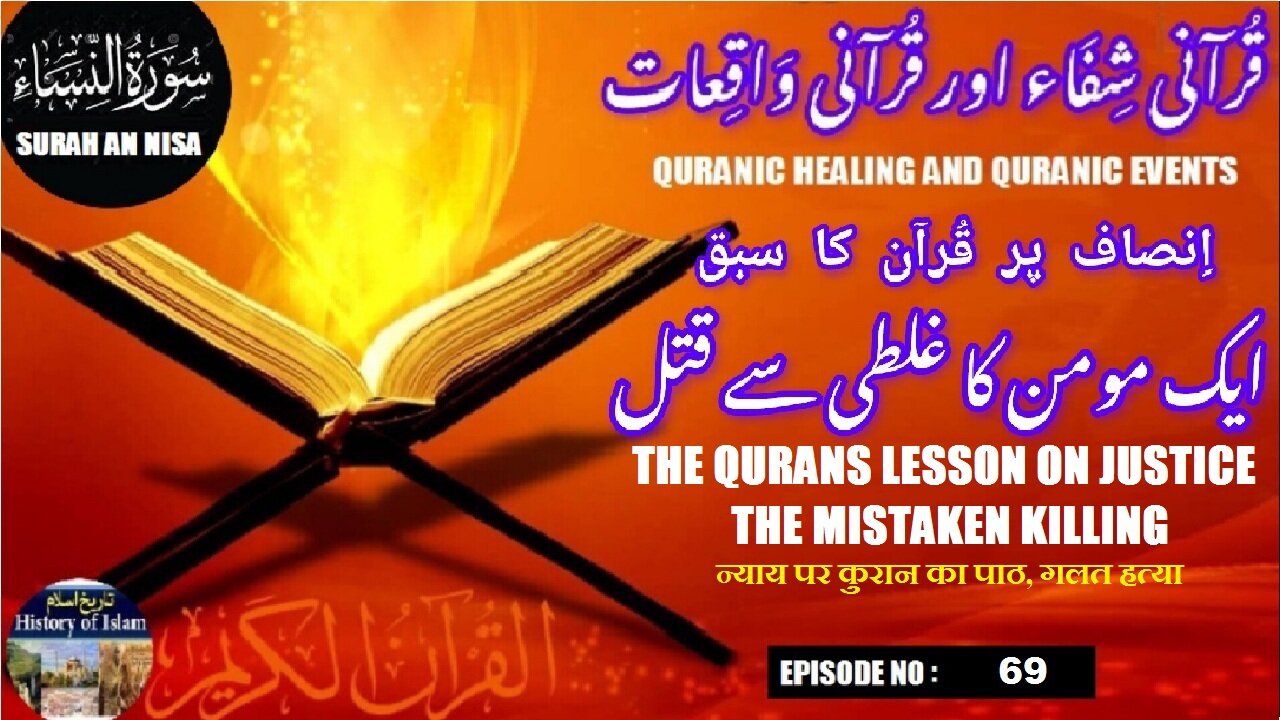Premium Only Content

The Qurans Lesson on Justice, The Mistaken Killing انصاف پر قرآن کا سبق، غلطی سے قتل
@islamichistory813 #healing #and #events #from #the #quran #historical #stories #and #events #quranicstories #selfhealing #success #stories #striking #events #in #history #quranstories, #storiesfromthequran #religious #creation #stories #trending #quran #short #historical #loves #historical #heroes #what #is #true #strength #calm #quran #recitation #for #babies #islamic #healing
The Quran’s Lesson on Justice, The Mistaken Killing of a Believer
Brothers, sisters, friends and elders Assalamu Alaikum, wa Rahmatullahi wa Barakatuhu, we are presenting the 69th episode of the Islamic informative video based on healing and events from the Holy Quran, and in this video we will describe, The Qur’an’s Lesson on Justice: The Mistaken Killing of a Believer
The Qur’anic verse 4:94 addresses a profound and solemn incident that occurred during the early years of the Muslim community, highlighting the critical importance of caution, justice, and humility, especially in the context of conflict and warfare. This verse refers to a tragic event where a Muslim mistakenly killed another believer, having wrongly assumed him to be an enemy or a disbeliever. The incident underscores not only the dangers of hasty judgments during turbulent times but also the ethical standards Islam places on distinguishing friend from foe and treating others with fairness and compassion. It serves as a powerful reminder of the sanctity of life and the need for careful verification before taking any irreversible action, especially when the lives of fellow believers are at stake.
The verse begins with a clear admonition: “O you who have believed, when you go forth \[to fight] in the cause of Allah, investigate; and do not say to one who offers you peace, ‘You are not a believer,’” reflecting a deep concern for the proper conduct of Muslims during warfare. This guidance emphasizes the virtue of *tahqiq*—thorough investigation and verification—before making decisions that could have dire consequences. The early Muslim community, newly establishing its identity and survival amid hostile forces, faced many dangers and uncertainties. The fear of enemy infiltration or betrayal was high, but this verse commands restraint and a deliberate approach rather than suspicion and rashness.
The phrase “do not say to one who offers you peace, ‘You are not a believer,’” is especially striking in its call for humility and openness. It highlights a common human failing: the tendency to judge others hastily based on incomplete information or personal biases. The verse instructs believers to accept peaceful overtures sincerely and to refrain from questioning the faith or intentions of those who approach with goodwill. This instruction was crucial during times of conflict when trust was fragile but necessary for survival and cohesion. It reminds Muslims that faith and belief are ultimately matters known to Allah alone, and it is not their place to declare who is or is not a true believer based on outward appearances or assumptions.
The context of this verse—an accidental killing—reflects the harsh realities of war, where confusion, fear, and split-second decisions often lead to tragic mistakes. The early Muslims faced enemies who sought to deceive and ambush them, making it difficult at times to distinguish friend from foe. Despite these challenges, the Qur’an sets a high moral standard, insisting that even in war, justice and the protection of innocent life must be paramount. This ethical framework is a testament to Islam’s broader commitment to human dignity and the sanctity of life, even amidst the chaos of battle.
Moreover, the verse implicitly condemns the arrogance and negligence that can lead to such fatal errors. When a Muslim wrongly kills another believing Muslim, it is not just a physical loss but a spiritual and communal wound. Such incidents threaten the unity and trust that bind the community together. By emphasizing investigation and peaceful interaction, the Qur’an calls on believers to foster an environment where suspicion does not breed violence and where peace overtures are given due respect. This directive encourages a mindset that values reconciliation and careful judgment over rash aggression.
The verse also serves as a cautionary tale about the dangers of extremism and zealotry. In the heat of conflict, some may be tempted to act harshly or presumptuously in the name of defending the faith. Yet, the Qur’an’s guidance reminds them that such behavior can cause great harm, including the loss of innocent life. This teaching is timeless and universal, resonating beyond the immediate historical context to warn against any form of violence fueled by prejudice or ignorance.
Furthermore, the incident and the accompanying verse reflect the Qur’an’s broader theme of mercy and forgiveness. While mistakes and sins may occur, there is always room for repentance and rectification. The community is encouraged to uphold justice but also to seek forgiveness and make amends when errors happen. This balance between justice and mercy is a hallmark of Islamic ethics and jurisprudence.
In practical terms, this verse shaped Islamic laws related to warfare, including the rules of engagement and treatment of non-combatants. It laid the groundwork for the principles of *hudna* (truce) and negotiation, emphasizing that peaceful resolution should always be sought and that those who come in peace should be treated with honor and fairness. It also reinforced the importance of verifying information and intentions before responding with hostility, a principle that remains relevant in modern contexts of conflict and diplomacy.
In conclusion, Qur’an 4:94 is a profound reflection on the gravity of taking a human life, especially within the complex realities of war. It underscores the necessity of caution, investigation, and respect for those who offer peace, warning against the dangers of hasty judgments and wrongful violence. The verse not only addresses a specific historical incident but also imparts enduring ethical principles that emphasize the sanctity of life, the importance of justice, and the value of mercy. It calls upon believers to uphold these values in all circumstances, fostering a community grounded in trust, compassion, and righteousness.
With this, we ask for your permission until tomorrow and pray to Allah Almighty to grant us the ability to act on the Quran and Hadith, Amen
Allah Hafiz
============================
-
 7:53
7:53
ISLAMIC HISTORY
17 hours agoBiography of Al-Abbas ibn Said al-Jawhari سیرت العباس بن سعید الجوہری
8 -
 2:08:38
2:08:38
TimcastIRL
9 hours agoNetflix Shares TANK, Elon Says BOYCOTT After Writer MOCKS Charlie Kirk Assassination
230K173 -
 8:48:01
8:48:01
SpartakusLIVE
11 hours agoI'M BACK || Quads w/ The Boys
87.3K7 -
 9:33
9:33
Ken LaCorte: Elephants in Rooms
14 hours ago $3.86 earnedWhy Do Black Men Love Big Butts?
31.5K24 -
 2:12
2:12
From Zero → Viral with AI
1 day ago $8.99 earned🚀 AI Marketing Isn’t Just for Big Brands Anymore — Here’s Why
46.8K10 -
 9:51:58
9:51:58
Dr Disrespect
18 hours ago🔴LIVE - DR DISRESPECT - 10 WINS ON CONTROLLER - BO7 TOMORROW
318K20 -
 1:24:56
1:24:56
Glenn Greenwald
12 hours agoTrump Declares Cities as the Enemies Within; Reagan Appointed Judge Slams Trump Over Speech Crackdowns; American ER Doctor on Gaza Atrocities | SYSTEM UPDATE #524
147K100 -
 4:07:42
4:07:42
I_Came_With_Fire_Podcast
18 hours agoPete Hegseth and the Chamber of Standards | Digital IDs | Taiwan Chips & Salsa | CDL Crisis
40.8K2 -
 2:01:46
2:01:46
Adam Does Movies
17 hours ago $0.73 earnedTalking Movies + Ask Me Anything - LIVE
25.1K -
 29:11
29:11
Nick Shirley
9 hours ago $5.83 earnedPortland has Fallen... ANTIFA Take Control of City
25.2K48